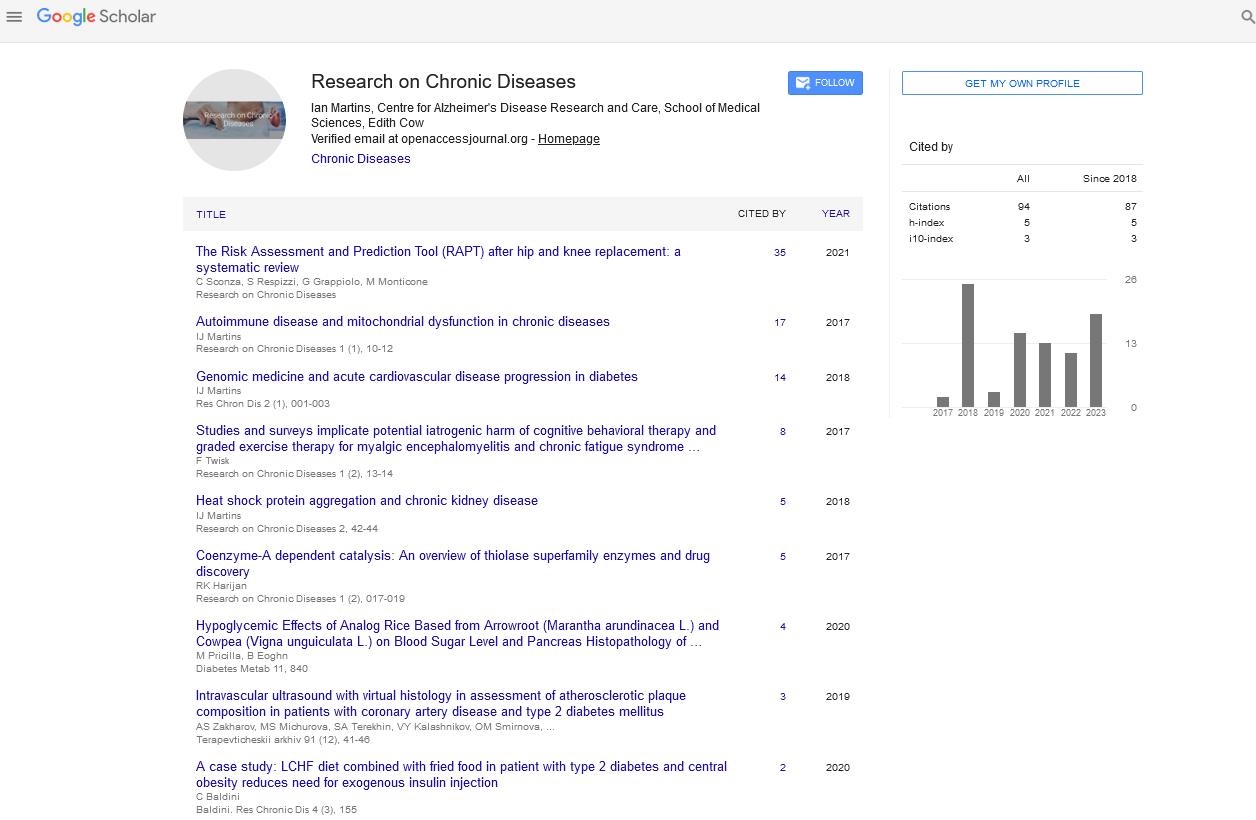Perspective - Research on Chronic Diseases (2024) Volume 8, Issue 2
A World Unseen: Navigating the Challenges and Triumphs of Blindness
- Corresponding Author:
- Tatjana Gazibara
Department of Ophthalmology,
University of Serbia,
Kladovo,
Serbia
E-mail: tatjanagazibara@604.com
Received: 06-Mar-2024, Manuscript No. oarcd-24-129021; Editor assigned: 11-Mar-2024, PreQC No. oarcd-24-129021 (PQ); Reviewed: 25-Mar-2024, QC No. oarcd-24-129021; Revised: 10-Apr-2024, Manuscript No. oarcd-24-129021 (R); Published: 17-Apr-2024, DOI: 10.37532/OARCD.2024.8(2).176-177
Introduction
Blindness, a condition characterized by the absence of sight, casts individuals into a world of darkness, where navigating daily life requires resilience, adaptation and unwavering determination. Yet, within the shadows of blindness lies a tapestry of experiences, perspectives and triumphs, illuminating the boundless potential of the human spirit. In this article, we embark on a journey to explore the multifaceted nature of blindness, shedding light on its impact, challenges and pathways to empowerment and inclusion.
Description
Understanding blindness
Blindness, often defined as the inability to see light or distinguish shapes and forms, encompasses a spectrum of visual impairments, ranging from mild to profound. It can result from various causes, including congenital conditions, such as retinitis pigmentosa or congenital cataracts, acquired diseases, such as glaucoma or diabetic retinopathy or traumatic injuries to the eyes or optic nerves.
The impact of blindness extends beyond the loss of visual acuity, affecting virtually every aspect of life, from mobility and independence to education, employment and social participation. Individuals who are blind or visually impaired often face barriers to accessing information, navigating physical environments and participating fully in society, leading to increased reliance on assistive technologies, adaptive strategies and community support systems.
Challenges and adaptations
Living with blindness presents a myriad of challenges, requiring individuals to develop innovative strategies, cultivate resilience and embrace alternative modes of perception and interaction with the world. Orientation and mobility skills, such as using a white cane or guide dog, navigating with auditory cues and memorizing spatial layouts, are essential for independent travel and navigation in unfamiliar environments.
Access to information and communication poses significant challenges for individuals who are blind or visually impaired, necessitating the use of alternative formats, such as braille, audio recordings or tactile graphics. Assistive technologies, including screen readers, magnification software and braille displays, empower individuals to access digital content, communicate with others and engage in educational and vocational pursuits.
Employment opportunities for individuals who are blind or visually impaired are often limited by misconceptions, discrimination and inaccessible work environments. However, with the right support, accommodations and advocacy, many individuals with visual impairments excel in diverse fields, from technology and finance to education and the arts, challenging stereotypes and paving the way for greater inclusion and diversity in the workforce.
Education and advocacy
Access to quality education is essential for individuals who are blind or visually impaired to reach their full potential and pursue their aspirations. Specialized educational programs, such as schools for the blind or inclusive classrooms with trained teachers and support staff, provide tailored instruction, adaptive materials and assistive technologies to meet the unique learning needs of students with visual impairments.
Advocacy plays a crucial role in promoting awareness, accessibility and equal opportunities for individuals who are blind or visually impaired. Advocates and organizations champion the rights of individuals with disabilities, push for policy reforms and raise public awareness about the barriers and discrimination faced by people with visual impairments, fostering a culture of inclusion, acceptance and empowerment for all.
Triumphs and contributions
Despite the challenges of blindness, individuals who are blind or visually impaired demonstrate remarkable resilience, creativity and contributions to society. From accomplished musicians and athletes to successful entrepreneurs and advocates, people with visual impairments defy stereotypes and inspire others with their achievements, talents and determination to overcome obstacles.
In the arts, blind artists create captivating works of visual art through tactile exploration, sculpting and other non-visual techniques, challenging conventional notions of perception and beauty. In literature, blind authors pen compelling narratives, memoirs and poetry that offer profound insights into the human experience, transcending the limitations of sight to connect with readers on a deeper emotional level.
In sports, blind athletes compete at the highest levels, showcasing their athleticism, skill and resilience on the world stage. From track and field to swimming, skiing and goalball, athletes with visual impairments excel in a wide range of sports, demonstrating the power of determination, discipline and teamwork to overcome adversity and achieve greatness.
Conclusion
Blindness is not merely the absence of sight; it is a testament to the indomitable spirit of the human soul, capable of transcending limitations, embracing diversity and achieving extraordinary feats of resilience and triumph. Through awareness, advocacy and inclusive practices, we can create a world where individuals who are blind or visually impaired are valued, respected and empowered to pursue their dreams and make meaningful contributions to society. Let us embark on this journey together, guided by empathy, compassion and a shared commitment to building a more inclusive and equitable future for all.
